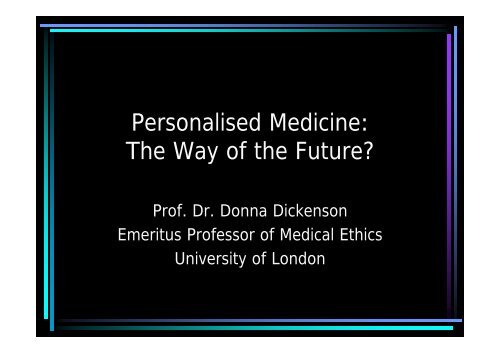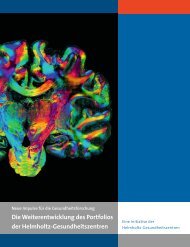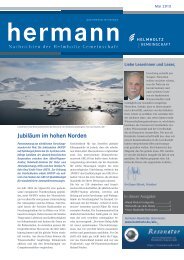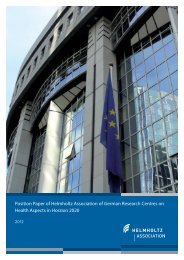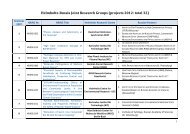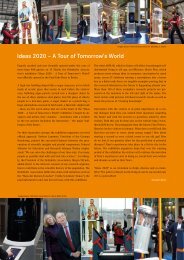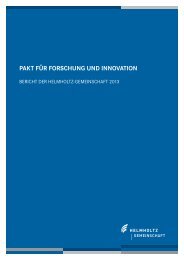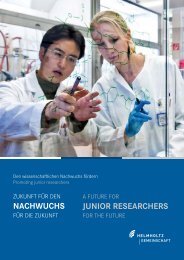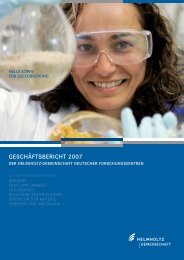Personalised Medicine: The Way of the Future?
Personalised Medicine: The Way of the Future?
Personalised Medicine: The Way of the Future?
Create successful ePaper yourself
Turn your PDF publications into a flip-book with our unique Google optimized e-Paper software.
<strong>Personalised</strong> <strong>Medicine</strong>:<br />
<strong>The</strong> <strong>Way</strong> <strong>of</strong> <strong>the</strong> <strong>Future</strong>?<br />
Pr<strong>of</strong>. Dr. Donna Dickenson<br />
Emeritus Pr<strong>of</strong>essor <strong>of</strong> Medical Ethics<br />
University <strong>of</strong> London
Big claims for personalized medicine<br />
• We are in a new era <strong>of</strong> <strong>the</strong> life sciences, but<br />
in no area <strong>of</strong> research is <strong>the</strong> promise greater<br />
than in personalized medicine.— Barack<br />
Obama, as a Senator introducing US<br />
Genomics and Personalized <strong>Medicine</strong> Act<br />
2007<br />
• But US presidents tend to make large<br />
claims—JFK even claimed to be a Berliner!<br />
• So let’s hear from a genetic scientist…
Francis Collins, <strong>The</strong> Language <strong>of</strong> Life<br />
(2010)<br />
• We are on <strong>the</strong> leading edge <strong>of</strong> a true<br />
revolution in medicine, one that promises to<br />
transform <strong>the</strong> traditional “one size fits all”<br />
approach into a much more powerful strategy<br />
that considers each individual as unique ...<br />
Although <strong>the</strong> scientific details to back up<br />
<strong>the</strong>se broad claims are still evolving, <strong>the</strong><br />
outline <strong>of</strong> a dramatic paradigm shift is coming<br />
into focus…[Y]ou have to be ready to<br />
embrace this new world.
Do I? Questions to ask<br />
• 1. Are <strong>the</strong>se predictions justified by <strong>the</strong><br />
evidence base?<br />
• 2. If so, are <strong>the</strong>re still ethical debates<br />
about how to implement personalized<br />
medicine?<br />
• 3. If not, why are <strong>the</strong>se claims being<br />
made?
1. What’s <strong>the</strong> evidence, past and<br />
present?<br />
• Plans to spend $416 million on a four-year<br />
PM plan were announced in December 2011<br />
by <strong>the</strong> US National Institutes <strong>of</strong> Health.<br />
Private sector interest is also intense.<br />
• But Human Genome Project (HGP) was also<br />
very generously funded, without having so far<br />
produced correspondingly weighty results for<br />
translational medicine.
Ano<strong>the</strong>r ‘paradigm shift’?<br />
• “Indeed, after 10 years <strong>of</strong> effort, geneticists<br />
are almost back to square one in knowing<br />
where to look for <strong>the</strong> roots <strong>of</strong> common<br />
disease” (Wade 2010 on HGP).<br />
• Productivity in drug development actually<br />
declined after <strong>the</strong> HGP announced its<br />
completion, as did new license applications to<br />
<strong>the</strong> US Food and Drug Administration<br />
(Kimmelman 2010).
A necessary reality check<br />
• Current genetic tests and molecular<br />
diagnostics only apply to about two per cent<br />
<strong>of</strong> <strong>the</strong> US population (United Health 2012: 3).<br />
• Poll <strong>of</strong> 2760 US patients and physicians in<br />
2012 indicated that doctors had only<br />
recommended personal genetic tests for four<br />
per cent <strong>of</strong> <strong>the</strong>ir patients.<br />
• Gradual process <strong>of</strong> incremental change,<br />
consistent with past trends in diagnostic<br />
innovation, but not yet paradigm shift .
<strong>The</strong> strongest evidence base:<br />
pharmacogenetics<br />
• Pharmacogenetic drug regimes could spare<br />
patients overtreatment that will do <strong>the</strong>m<br />
more harm than good by minimising adverse<br />
drug reactions and adjusting treatment to<br />
cancer’s genome as well as patient’s.<br />
• Not limited to oncology: H3 Project (Human<br />
Heredity and Health in Africa) applies genome<br />
scanning and sequencing to HIV/AIDS,<br />
tuberculosis and malaria.
Example <strong>of</strong> PM from cancer care<br />
• Gene-specific drug Vemurafenib (Zelboraf) for<br />
aggressive melanoma extended life span <strong>of</strong><br />
25% <strong>of</strong> patients 16 months (9 months in<br />
conventional treatment); 75% didn’t benefit.<br />
(Sosman et al. 2012, NEJM)<br />
• However, a genome-wide analysis study on<br />
kidney cancer patients (Gerlinger et al. 2012,<br />
NEJM), published a month later, was much<br />
more pessimistic.
Why second study is discouraging<br />
• Single tumour found to have many<br />
different genetic mutations at different<br />
locations.<br />
• Two-thirds <strong>of</strong> genetic faults identified<br />
not repeated in same tumour, let alone<br />
in o<strong>the</strong>rs metastasized through body.<br />
• If pharmacogenetic drug targets one<br />
mutation, it may not work on o<strong>the</strong>rs.
Non-pharmacogenetic success<br />
• Conversely, progress in cancer care is<br />
still possible with ‘one size fits all’<br />
treatments, even for genetically linked<br />
cancers.<br />
• Single daily 600mg dose <strong>of</strong> aspirin<br />
resulted in 63% reduction in colorectal<br />
cancers in patients with hereditary<br />
Lynch syndrome. (Geddes et al. 2011)
Me <strong>Medicine</strong>: <strong>the</strong> full range<br />
<strong>Personalised</strong> medicine comprises very<br />
wide range <strong>of</strong> procedures:<br />
• 1. Direct-to-consumer genetic tests<br />
• 2. Pharmacogenetics<br />
• 3. Private umbilical cord blood banking<br />
• 4. Enhancement technologies such as<br />
neurocognitive and drug treatments to<br />
produce ‘<strong>the</strong> best me I can possibly be’
Me vs. We <strong>Medicine</strong><br />
• Pharmacogenetics, have a good<br />
evidence base, but o<strong>the</strong>r forms <strong>of</strong> MM<br />
are largely unproven and sometimes<br />
harmful.<br />
• By contrast, We <strong>Medicine</strong> (vaccination,<br />
screening and o<strong>the</strong>r public health<br />
measures) produced greatest expansion<br />
in life expectancy but is now threatened<br />
by austerity cuts and public distrust
Hostility to vaccination worldwide<br />
• Vaccination programs are in pr<strong>of</strong>ound trouble:<br />
US and UK campaigns against MMR vaccine.<br />
• India: reaction against vaccination <strong>of</strong> young<br />
girls against <strong>the</strong> human papillomavirus<br />
implicated in cervical cancer.<br />
• Muslim areas <strong>of</strong> nor<strong>the</strong>rn Nigeria, which<br />
accounts for about 45% <strong>of</strong> polio cases<br />
worldwide: WHO polio vaccination campaign<br />
was boycotted as Western plot to spread HIV<br />
and AIDS through adulterated injections.
2. Economic and ethical questions<br />
• Gene-specific drugs will probably be<br />
very expensive because <strong>of</strong> small market<br />
(e.g. Xalkori for lung cancer, price<br />
$115,200 p.a.)<br />
• If patients who can benefit will be<br />
minority, would it be fair to devote<br />
majority <strong>of</strong> our scarce resources to<br />
<strong>the</strong>m? Not just rhetorical question.
Social justice and individual health<br />
• In 19 th c., rich and poor alike were vulnerable<br />
to epidemics such as cholera, smallpox and<br />
typhus, so public health measures served all<br />
equally<br />
• This is still true <strong>of</strong> pandemic flu, but more<br />
typically, infectious disease has been replaced<br />
by cancer and cardiovascular disease as main<br />
cause <strong>of</strong> mortality; illness has been<br />
individualised.
Stratified medicine in two senses?<br />
• 1. Clinical 2. Economic and social<br />
• Will personalised medicine increase<br />
social and economic inequality?<br />
• It’s not obvious that <strong>the</strong> poorest will<br />
necessarily be <strong>the</strong> have-nots if PM gains<br />
ground, but publicly funded systems will<br />
find <strong>the</strong>mselves denying some patients<br />
treatment.
3. If evidence for PM is uneven, why<br />
are such large claims being made?<br />
• In our society, where individualism and<br />
choice are highly valued, ‘personalised’ is<br />
automatically assumed to be good<br />
• Perhaps <strong>the</strong> favourable term is being used to<br />
prejudge <strong>the</strong> debate about whe<strong>the</strong>r we<br />
should put our available resources into Me or<br />
We <strong>Medicine</strong>?<br />
• Except perhaps in pharmacogenetics, science<br />
alone doesn’t explain rise <strong>of</strong> Me <strong>Medicine</strong>
Four o<strong>the</strong>r explanations for PM<br />
• 1) Threat and contamination<br />
• 2) Growth <strong>of</strong> narcissism<br />
• 3) Corporate interests and government<br />
policies favouring <strong>the</strong>m<br />
• 4) Sacredness <strong>of</strong> personal choice<br />
• Not all equally convincing
1. Threat and contamination<br />
• Eurobarometer survey: nearly half <strong>of</strong><br />
respondents reject public banked blood<br />
• 25% <strong>of</strong> European population would only<br />
accept own stored blood for transfusion;<br />
ano<strong>the</strong>r 23% would only accept from family<br />
• Public blood bank contamination scandals in<br />
France and UK<br />
• Does sense <strong>of</strong> threat from public medicine<br />
leads to interest in personalised medicine?
2. Narcissism<br />
• Is it only a coincidence that <strong>the</strong> words<br />
“me” and “my” are part <strong>of</strong> <strong>the</strong> brand for<br />
so many genetic testing companies? –<br />
such as 23andMe, Knome, deCODEme<br />
and MyGenome.<br />
• Or is retail genetics part <strong>of</strong> a more<br />
generalized trend towards narcissism<br />
and self-absorption, with a decline in<br />
social capital and communal solidarity?
3. Corporate interests<br />
• Facing patent expiry on blockbuster drugs,<br />
pharmaceutical industry needs to find a new<br />
business model: ‘niche’ personalized drugs<br />
• Personal genetic firms pursue strategy <strong>of</strong><br />
accumulating genetic and lifestyle data and<br />
claiming valuable patents (e.g. 23andMe<br />
Parkinson’s disease patent)<br />
• ‘Personalisation is sometimes represented as<br />
a response to demand, but in some cases at<br />
least it seems to be a case <strong>of</strong> supply looking<br />
for demand’ (e.g. private cord blood banks).
4. Personal choice and autonomy<br />
• Dominant values in Anglo-American<br />
medical ethics (less so in Scandinavia,<br />
France and Germany, but personalised<br />
medicine less advanced <strong>the</strong>re)<br />
• Pharmacogenetics does enhance patient<br />
choice to some degree, but not when it<br />
results in denial <strong>of</strong> treatment
Conclusions<br />
• Good practitioners have always relied on<br />
close observation <strong>of</strong> <strong>the</strong> particular patient. As<br />
Hippocrates said, “It is far more important to<br />
know what person <strong>the</strong> disease has than to<br />
know what disease <strong>the</strong> person has”.<br />
• <strong>Personalised</strong> medicine was already <strong>the</strong> way <strong>of</strong><br />
<strong>the</strong> past. Jury is out on whe<strong>the</strong>r Me <strong>Medicine</strong><br />
will be <strong>the</strong> way <strong>of</strong> <strong>the</strong> future.<br />
• But we need to think carefully about how to<br />
balance its claims against those <strong>of</strong> We<br />
<strong>Medicine</strong>.


